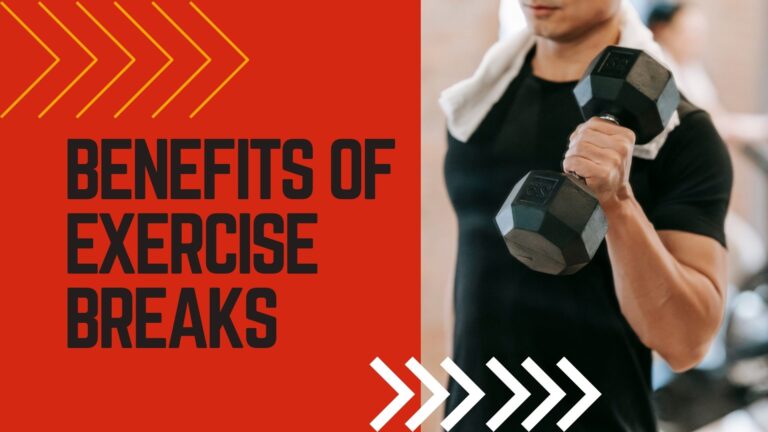In today’s fast-paced world, many of us are glued to our desks, barely moving for hours on end. But did you know that taking short exercise breaks can dramatically improve both your physical and mental health? Moving throughout the day is vital to keeping your body and brain functioning at their best. Exercise breaks, even if they only last a few minutes, can revitalize your energy, enhance productivity, and improve overall well-being. In this article, we’ll dive deep into the benefits of exercise breaks and how they can positively impact your day.

What Are Exercise Breaks?
Exercise breaks are short bursts of physical activity that you take throughout the day to break up long periods of sitting or working. These breaks don’t have to be intense or lengthy to provide significant health benefits. Simple movements like stretching, walking, or light aerobics count as exercise breaks and can be incorporated into your workday or study routine. The goal is to get your body moving, your heart rate slightly elevated, and to give your muscles a chance to stretch and relax.
Why Are Exercise Breaks Important?
Sitting for extended periods can take a toll on your body and mind. Exercise breaks are essential because they help combat the negative effects of prolonged sitting. By incorporating these breaks into your day, you can not only boost your physical health but also enhance your productivity and mental clarity. Movement stimulates blood flow, delivering oxygen and nutrients to your brain and muscles, which in turn helps you stay alert and focused.
Physical Health Benefits of Exercise Breaks
Improved Cardiovascular Health
Even brief bursts of movement can improve circulation, lower blood pressure, and enhance heart health. Regular exercise breaks can help prevent cardiovascular issues caused by sedentary behavior, such as high cholesterol and hypertension.
Increased Muscle Strength and Flexibility
When you sit for too long, your muscles tighten, especially in the hips, back, and neck. Exercise breaks allow you to stretch and engage your muscles, which can prevent stiffness and improve overall flexibility. Over time, these breaks can even help build strength in key areas like your core and legs.
Enhanced Posture and Spine Health
Sitting hunched over a desk can lead to poor posture and spine problems. Incorporating exercise breaks that focus on posture, such as shoulder rolls or back stretches, can help alleviate discomfort and support a healthier spine alignment.

Mental Health Benefits of Exercise Breaks
Reduced Stress and Anxiety
Exercise is a proven stress-buster. Taking a break to move your body can reduce cortisol levels, the hormone associated with stress. This quick mood boost can help you return to your tasks with a clearer mind and a more positive outlook.
Boosted Cognitive Function
Studies show that exercise can improve cognitive function, including memory and concentration. Even short, frequent breaks can give your brain the reset it needs to work more efficiently.
Enhanced Creativity and Problem-Solving Skills
Ever feel stuck on a problem, only to find a solution after stepping away for a bit? That’s because exercise increases blood flow to the brain, helping you think more creatively and find solutions faster.
Exercise Breaks and Workplace Productivity
Reducing Fatigue and Burnout
Sitting for hours on end can drain your energy, but taking regular exercise breaks can recharge your mental and physical batteries. These short bursts of activity can prevent the mid-afternoon slump, helping you maintain productivity throughout the day.
Increasing Focus and Attention Span
Exercise breaks act like a reset button for your brain. When you return to work after moving your body, you’ll find that your focus is sharper, and your attention span has increased. This is because physical activity stimulates the brain and improves cognitive performance.
How Small Movements Can Reset the Brain
Even small movements, like stretching your arms or standing up and walking for a minute, can reset your brain. These actions reduce brain fog and help you feel refreshed, making it easier to tackle complex tasks.
How Often Should You Take Exercise Breaks?
Timing Your Breaks for Maximum Benefit
Experts suggest taking a break every 30 to 60 minutes. This can be as simple as standing up, stretching, or taking a short walk around your office. Frequent, short breaks are more beneficial than longer, less frequent ones.
Length and Intensity of Exercise Breaks
While even a one-minute break can make a difference, aim for 5 to 10 minutes of moderate movement. This can be a mix of stretching, walking, or light exercises like squats or lunges.

Best Types of Exercise Breaks for Office Workers
Desk Stretches and Mobility Exercises
Simple stretches you can do at your desk, like shoulder rolls, neck stretches, and wrist stretches, help relieve tension built up from typing or sitting for long periods.
Quick Cardio Bursts
If you have space, quick cardio bursts like jumping jacks or high knees can get your heart pumping and boost energy levels. Even a few minutes of this kind of activity can lift your mood and keep you energized.
Walking and Stepping Exercises
A short walk around the office or stepping in place can help increase circulation and reduce the risk of blood clots caused by sitting too long.
Conclusion
Incorporating regular exercise breaks into your day can do wonders for your physical health, mental well-being, and productivity. Movement is key to keeping your body and brain in top shape, even during a busy day at work or school. Whether you’re stretching at your desk, walking around your home office, or taking a quick cardio burst, every little bit of movement counts. By making these breaks a habit, you’ll not only feel better but also work more efficiently.
FAQs
Can I see benefits from just a few minutes of movement?
Yes! Even 1-2 minutes of movement can improve circulation, reduce tension, and boost your mood.
What are the best exercises for quick breaks?
Desk stretches, walking, and quick cardio bursts like jumping jacks are great options for short breaks.
How can exercise breaks improve my mood?
Physical activity releases endorphins, which are natural mood enhancers, helping to reduce stress and increase happiness.
How can I motivate myself to take regular exercise breaks?
Set reminders on your phone or computer and make movement a non-negotiable part of your routine.


